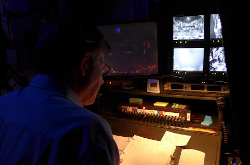브로드웨이 무대 감독

The Tony Awards were presented June 11 in New York City. The awards honor plays presented in the theater area of New York known as Broadway.
The musical play “Dear Evan Hansen” won six awards. It tells the story of a lonely high school student. He falsely tells people he was the friend of another student who has killed himself.
The play won Tonys for best musical, best leading actor and best featured actress in a musical.
Tony awards are also given to writers, directors and designers. Others who work “behind the scenes,” like stage managers, are not nominated for awards. But without them, plays could not be performed.
VOA recently talked to some stage managers about their work.
The job requires them to spend a lot of time looking at video camera images. They also usually wear a headset that lets them hear and be heard by members of the cast and crew.
“Good evening ladies and gentlemen. Welcome back from dinner. The call is half hour. Half hour please. This is your half hour call.”
Ira Mont is the stage manager of the long-running musical “Cats.”
“I like to think of a stage manager as the chief operations officer of the corporation that is the show.”
Karyn Meek is production stage manager for another Tony-nominated play -- the musical “Natasha, Pierre & The Great Comet of 1812.”
“I would call us the hub of the wheel. We are the person in charge of communication across all departments and also management and to the cast as well.
During the show, we are in charge of making sure the lights happen, the set moves, sound happens, all the things; we are the person who’s controlling all of that, as well as somebody who’s backstage supervising the crew.”
Donald Fried is the stage manager of the Tony-nominated play “Sweat,” written by Lynn Nottage. He says the stage manager becomes involved with the play long before it is performed.
“Everything begins and ends with the script. I gotta read the script, read it several times. Once, just to read it as a person, not as a stage manager or an artist or anything. Just to have an initial emotional feeling for it.
Then, I go back in and I read Lynn’s stage directions so that I know what would happen light-wise, how she envisions the props, how she envisions the set moving, people entering and exiting, whether or not they’re changing costumes.”
The stage manager is especially busy in the half hour before a performance begins.
Karyn Meek has climbed a ladder to a place high above the stage. In the play she is managing, actors perform throughout the theater, so she needs a high place from which to watch them. She follows a musical score, with notes showing all of the many lighting and technical cues.
Meek calls hundreds of sound and tech cues for each performance.
Many stage managers began their Broadway careers doing other things -- Karyn Meek was a costume designer, Donald Fried was a dancer and Ira Mont was an actor.
Mont used to hear crowds cheer for his performances. But as a stage manager he does not. However, he told VOA he would not want to do anything else.
“I don’t expect or look for praise or acknowledgement. I am here to support the shows I work on and the actors who do them, and that’s what gives me the joy. And I’m very fortunate to have had a 30-year career in a profession that is not easy to get into and is not easy to stay in. I’m a lucky guy.”
And Broadway is also lucky to have its stage managers.

